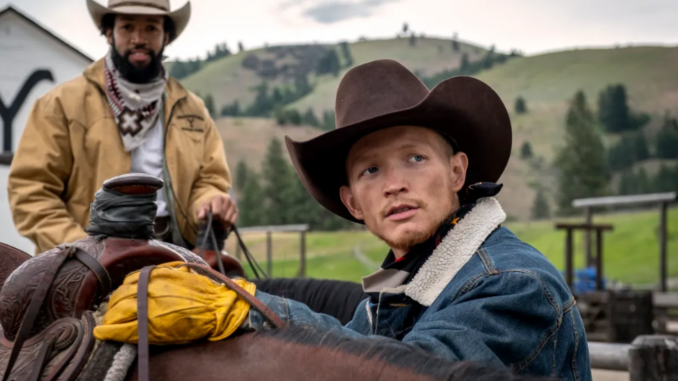
America, as expounded by Cousin Greg from Succession and Jimmy, the ranch hand from Yellowstone
Yellowstone’s semi-chaotic sociopolitical ethos can also be explained through one final comparison to Succession. Both series begin with a lanky, good-natured jerk who is introduced into the central setting of the series. In Succession, that jerk is Cousin Greg, the show’s comic relief, a comet hurtling toward the Roy family nucleus from an Oort cloud where James Cromwell lives. (That’s Canada.)
In Yellowstone, that jerk is Jimmy, the ranch hand (Jefferson White), who is nearly kidnapped, then branded with Dutton’s familiar Y in the series’ first episode. As the show progresses, we watch Jimmy, a former jerk, slowly but surely learn to become an effective ranch hand, then a solid rodeo rider, then a pretty decent boyfriend.
To some extent, Succession is a show about whether Greg will be corrupted by his entanglement with the Roy family. The show isn’t a battle for his soul, but at least his soul is a passing concern in its moral calculus.
Yellowstone, by contrast, treats Jimmy’s recruitment into a ranching operation that, once again, commits endless, gratuitous murders as an almost undeniably good thing. He was a lazy loser, and now he lives and works on a ranch where he can learn the value of a hard day’s work. The show even has a lot of humor in pairing him into scenes with Rip, the manager, which means Yellowstone has its own Tom and Greg. (MONICA IS GERRI DON’T TEST ME HERE, I’M GOING DEEP INTO THIS.)

Now, Cousin Greg can be a funny TV character, and he can be slowly corrupted by the Roy family. Succession is really good at exploring that tension. Likewise, Jimmy can gain a lot of value by learning to be the best ranch hand he can be, and the ranch he works on can be full of murderous thugs. But I’m not sure Yellowstone is aware of that tension for more than a few minutes.
Yellowstone’s “villains” tend to be big-city developers or petty criminals hanging around the edges of the Dutton ranch, hungry for a piece of its giant pie. The show mostly uses these villains to say, “Sure, John Dutton isn’t great, but at least he’s not these guys!” The princess is always in a different castle, and every time Yellowstone seems like it might be able to focus on a reasonable point, it flies off in another direction, scared of itself.
I called Yellowstone loosely “Red State Legacy” above, and that implies a kind of cultural conservatism that it doesn’t really show. There’s an episode where a woman has an abortion, and even though it ruins her life forever, her choice to have an abortion is largely framed as the right choice for her to make. (Moreover, the plot somehow incorporates a mostly coherent rebuke of forced sterilization on reservations, which I really didn’t expect to see.)
The series will happily acknowledge that its Native characters have a point about their land being stolen. And even as it gets nasty with all its female characters, subjecting them to all sorts of horrors so they can be saved by a man, there’s something endearing about the way these women also show solidarity by looking at each other’s bruises, bruises they’ve suffered at the hands of bad men.
The effect is such that Yellowstone is at least vaguely sympathetic to the helpless at every turn, but only in the sense that it’s willing to acknowledge their existence. It points to the power structure, nods to the fact that a few control far more wealth and power than the many, and then suggests that there’s really nothing that can be done about it. Yellowstone has read it, highlighted key passages, and concluded that the world is just the way it is. Further interrogation of that idea might push John Dutton off the top of the pyramid, and John Dutton is the main character.
Occasionally, Yellowstone even pretends to imply that the Dutton family themselves are among the powerless, at least in the face of the sweeping change that’s coming to their state. Part of the third season is devoted to examining whether the family is actually wealthy, when in fact their ranch is losing a lot of money. (It’s funny that Yellowstone’s best argument for John to keep his ranch is “Oh, it’ll be over soon! Let him have this!”)
However, the developers have suggested that
